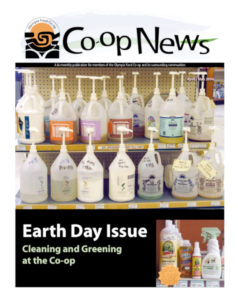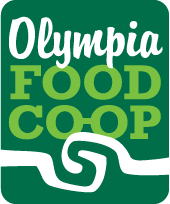Co-op News April & May 2006 PDF
THE HIGH COST OF NEW BAGS
March was National Waste Awareness Month, and the staff members want to honor our members who already contribute to the reduction of waste. You are the ones who bring your own cloth shopping bags, coffee mugs and tea cups, eating utensils, or maybe you carry your groceries home in one of the plentiful boxes generated by your Co-op. Maybe you’re not even aware you contribute by these simple actions; believe me, you most certainly do.
Has it ever occurred to you how many plastic and paper bags, soup or salad containers, coffee cups, plastic lids and wooden stirrers, plastic or wheat forks, spoons, knives and straws you go through at your Co-op? Here are a few numbers that may surprise you. The average cost of a plastic or small paper bag is $.02; #12 paper bags are $.03; large paper bags with handles are $.11 and non- handle ones are $.07 each. At the westside, we order, on average, 3 bales (500 bags per bale) a week of handled paper bags. At the eastside, we order 7 bales a week. As far as plastic bags go, at the Eastside, we order 2 – 3 case per month of the flat bags used in produce and bulk that are manually ripped. We order 4 – 5 cases per month of the pull and pack bags (the ones with tabs) used in the produce department. A case is comprised of 4 rolls of bags, with each roll having around 750 bags on it. At the westside, we order 3 – 4 cases of both types of plastic bags. Lastly, the eastside Co-op’s average monthly bill for all of those soup containers with lids, salad boxes, and to-go utensils is $553.98.
That’s just the financial impact on your store. Here are some scary facts about the impact on your environment. Did you know plastic bags are made from oil? That’s petroleum, a non renewable resource, which is shipped here on oil tankers or transported by fuel guzzling trucks that contribute to global warming emissions. Then, more toxic chemical ingredients spew into our world in the manufacturing process. About 100,000 whales, seals, turtles, and other marine animals are killed by plastic bags each year! They mistake them for food and either choke or have their digestive systems blocked, resulting in agonizing death. The same fate awaits land animals, domestic and wild,
foraging for food. Plastic bags take up to 1,000 years to break down in a landfill. Roadside litter breaks down into tiny bits contaminating our soil and water; those colorful inks are toxic, too.
Well over a billion single-use plastic bags are given out for free each day; over 100 billion are thrown away each year. Some of you may think paper is a more environmentally
thoughtful choice; think again. In 1999, 14 million trees were cut to produce the 10 billion paper bags we used as consumers. Paper bags come from one of two places: Canada, where 90% of the timber is old-growth forests, or southeastern United States, where the timber companies are replacing native woodlands with monocultural trees at an alarming rate. The manufacture of paper bags requires virgin timber and more fresh water than any other industry. The processing stage creates numerous polluting by-products in our waterways and produces greenhouse gases. (Ever wonder why Tacoma smells so bad? It’s the paper processing plants.) In fact, a study by the Fil and Bag Federation, paper bag production requires more energy concludes that generates more solid waste, creates more atmospheric emissions, and releases more waterborne wastes than plastic bag production. Need more fun facts to help support change? It costs retailers an estimated $4 billion every year to give you a free bag to carry home your goods. But, is it really free? Actually, you pay higher prices at the register.
Here in the United States we have made little effort to change the plastic or paper bag dilemma. However, we can learn from more conscientious and progressive countries. Australia, New Zealand, Ireland, Italy, Mumbai (formerly Bombay),Taiwan, Bangladesh, India, and South Africa now either prohibit or heavily tax the flimsy plastic bag. They were found clogging drainage and sewage lines, increasing flooding and waterborne diseases, or littering the landscape. Instead, shoppers bring their own bags, baskets, or boxes to market.
How do we break habits and protect our environment? How can we better manage our waste? Buy products that require little or no packaging. Remember our reusable shopping bags and containers for bulk products. Perhaps we should create a punch card system wherein each time you bring your own bags, containers, and take-out deli utensils and containers, or re-use the boxes at the store, you receive a punch. For each card filled you could get a Co-op dollar. Do we need an extra tax at the register, or should we just outright ban one time use plastic or even paper bags? That seems so extreme; hopefully not what it will take. What’s your take on take-out? Can we consent to control our consumption? This society is all about choices. How will you choose?
The Co-op wants to hear your ideas on this waste management and supplies issue. Find suggestion forms at either store location.
By Connie Bunyer, staff member
Co-op News April & May 2006 PDF
